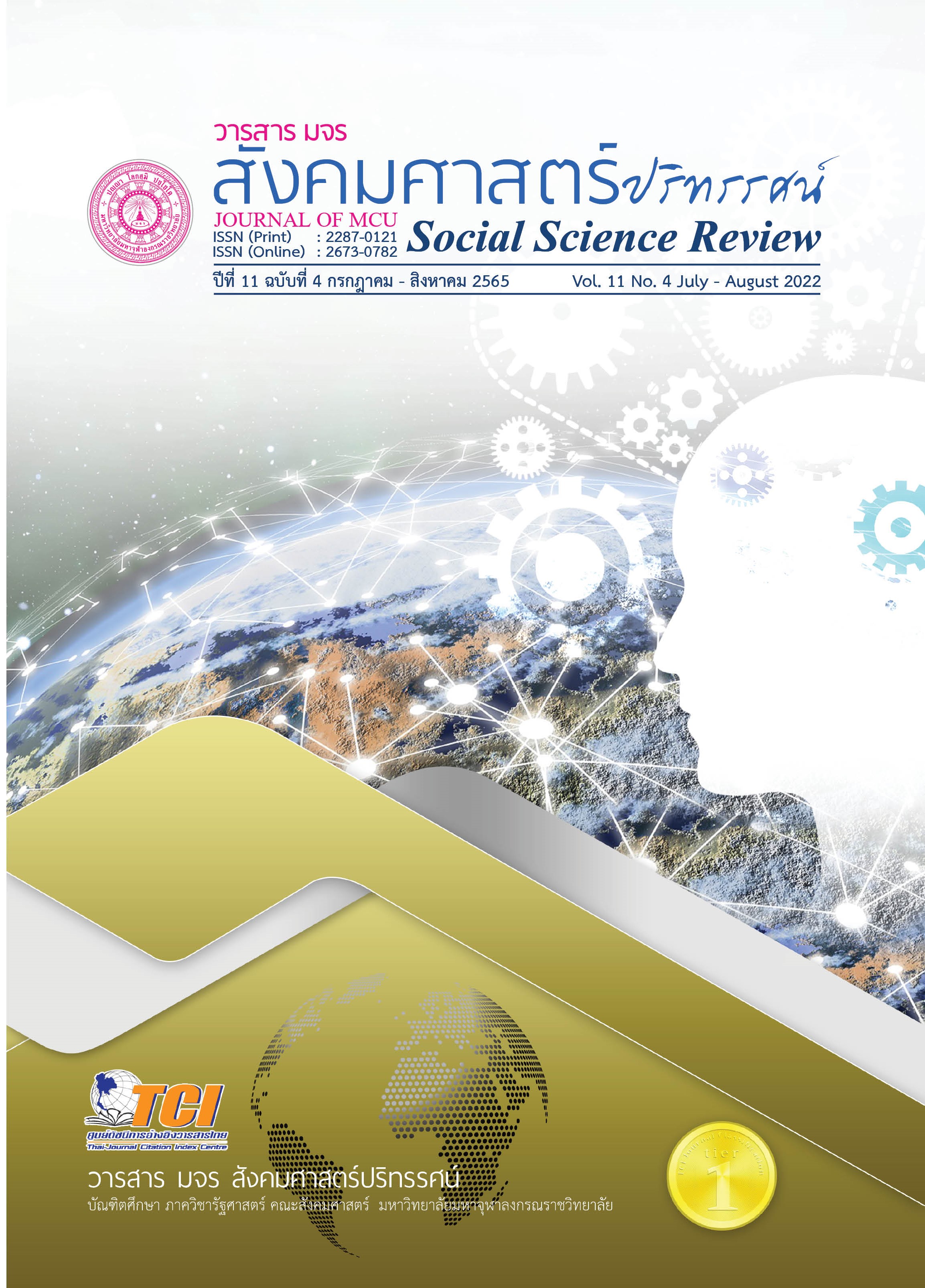การสร้างกระบวนการทำบุญตามหลักพระพุทธศาสนาในสังคมไทย
คำสำคัญ:
การทำบุญ, พระพุทธศาสนา, สังคมไทยบทคัดย่อ
บทความวิจัยนี้มีวัตถุประสงค์ 1. เพื่อศึกษาการทำบุญตามหลักพระพุทธศาสนาเถรวาท 2. เพื่อศึกษาวัฒนธรรมชาวพุทธกับการทำบุญในสังคมไทย และ 3. เพื่อสร้างกระบวนการทำบุญตามหลักพระพุทธศาสนาสำหรับสังคมไทย การวิจัยนี้ใช้ระเบียบวิจัยเชิงคุณภาพโดยเก็บรวบรวมข้อมูลจากเอกสารและสัมภาษณ์เชิงลึกผู้ให้ข้อมูลสำคัญ จำนวน 5 ท่านเลือกแบบเจาะจงจากผู้เชี่ยวชาญ โดยใช้เครื่องมือในการวิจัย คือ แบบสัมภาษณ์
ผลการวิจัยพบว่า 1) การทำบุญตามหลักพระพุทธศาสนาเถรวาท ชาวพุทธตั้งต้นจากศรัทธาในพระพุทธเจ้า แล้วทำบุญกับพระองค์ จากนั้นพระพุทธเจ้าจึงสั่งสอนธรรมะให้เกิดปัญญาเป็นลำดับต่อมา ศรัทธาควรมาคู่กับปัญญา 2) วัฒนธรรมชาวพุทธกับการทำบุญในสังคมไทย มีความหลากหลายตามยุคสมัย แต่พบว่า การทำบุญส่วนใหญ่นั้นไม่เป็นไปตามหลักของทางพระพุทธศาสนา ที่เกิดจากความไม่เข้าใจในเรื่องการทำบุญ หลักการ ความหมาย ผลของการทำบุญ และก่อให้เกิดความเดือดร้อนต่อตนเอง และสังคม 3) กระบวนการทำบุญตามหลักพระพุทธศาสนาสำหรับสังคมไทย คือการสร้างความเข้าใจในการทำบุญที่ถูกต้องตามหลักพระพุทธศาสนา ประกอบด้วย ด้านแนวคิด (ก่อนการทำบุญ) ด้านการปฏิบัติ (การทำบุญ) และ ด้านผลลัพธ์ (ผลการทำบุญ) เมื่อทำบุญไปแล้วย่อมได้รับอานิสงส์ของบุญ ซึ่งมีความแตกต่างกันออกไป มีทั้งความรู้สึกเป็นสุขทันทีที่ได้ทำบุญ อานิสงส์ที่เป็นที่พึ่งในโลกนี้ และโลกหน้า
เอกสารอ้างอิง
กรีสุดา เฑียรทอง. (2524). การศึกษาเปรียบเทียบความเชื่อเรื่องบุญและบาป ในพุทธศาสนาและคริสตศาสนาและผลของความเชื่อที่มีผลต่อวิถีทางดำเนินชีวิตของพุทธศาสนิกชนและคริสตศาสนิกชน: ศึกษาเฉพาะกรณี ตำบลสำเภาล่ม อำเภอพระนครศรีอยุธยา จังหวัดพระนครศรีอยุธยา (วิทยานิพนธ์ปริญญามหาบัณฑิต สาขาศาสนาเปรียบเทียบ).กรุงเทพฯ: มหาวิทยาลัยมหิดล.
จรูญศรี ลิ่มสัจจา. (2528). การศึกษาวิเคราะห์เปรียบเทียบ ความเชื่อและการปฏิบัติทางด้านศาสนาของคนในสังคมเมือง: ศึกษาเฉพาะในกรณีชาวพุทธและชาวมุสลิมในชุมชนกิ่งเพชรกรุงเทพมหานคร (วิทยานิพนธ์ปริญญาอักษรศาสาตร์มหาบัณฑิต สาขาศาสนาเปรียบเทียบ). กรุงเทพฯ: มหาวิทยาลัยมหิดล.
พรสวัสดิ์ เพชรแดง. (2528). ความเชื่อในเรื่องบุญ-บาป ในพระพุทธศาสนาของนักเรียนชั้นมัธยมศึกษาปีที่ 6 ในเขตกรุงเทพมหานคร. (วิทยานิพนธ์ศิลปศาสตรมหาบัณฑิต สาขาวิชาการสอนสังคมศึกษา). กรุงเทพฯ: มหาวิทยาลัยเกษตรศาสตร์.
พระพรหมคุณาภรณ์ (ป.อ. ปยุตฺโต). (2547). ก้าวไปในบุญ. กรุงเทพฯ: โรงพิมพ์มหาจุฬาลงกรณราชวิทยาลัย.
พระมหาวิศิษฎ์ ทสฺสนีโย (ศรีคะรัตน์). (2550). ความเชื่อเรื่อง "กฏแห่งกรรม" ของนักเรียนโรงเรียนพุทธิโศภน ตำบลพระสิงห์ อำเภอเมือง จังหวัดเชียงใหม่ (วิทยานิพนธ์ศาสนศาสตรบัณฑิต สาขาวิชาพุทธศาสตร์) นครปฐม: มหาวิทยาลัยมหามกุฏราชวิทยาลัย.
พระมหาเอกนรินทร์ เอกนโร (วงษ์ขันธ์). (2536). การศึกษาเชิงวิเคราะห์เรื่องบุญในพุทธปรัชญาเถรวาทและปรัชญาคริสต์นิกายโรมันคาทอลิก (วิทยานิพนธ์พุทธศาสตรมหาบัณฑิต สาขาปรัชญา). พระนครศรีอยุธยา: มหาวิทยาลัยมหาจุฬาลงกรณราชวิทยาลัย.
พระสุธีธรรมานุวัตร (เทียบ สิริญาโณ) และคณะ. (2560). หลักกรรมทางพระพุทธศาสนาในวิถีชีวิตสังคมไทย. (รายงานการวิจัย). กรุงเทพฯ: สำนักงานคณะกรรมการการอุดมศึกษา.
มหาจุฬาลงกรณราชวิทยาลัย. (2539). พระไตรปิฎกภาษาไทย ฉบับมหาจุฬาลงกรณราชวิทยาลัย. กรุงเทพฯ: โรงพิมพ์มหาจุฬาลงกรณราชวิทยาลัย.
สมศักดิ์ ชุมสาย. (2518). ทัศนคติและความสนใจต่อพระพุทธศาสนาของเยาวชนที่ศาลพิพากษาว่ากระทำความผิด. (วิทยานิพนธ์สังคมสงเคราะห์ศาสตรมหาบัณฑิต สาขาวิชาสังคมสงเคราะห์. กรุงเทพฯ: มหาวิทยาลัยธรรมศาสตร์.
สุชีพ ปุญญานุภาพ. (2516). คุณลักษณะพิเศษแห่งพระพุทธศาสนา. กรุงเทพฯ: โรงพิมพ์คุรุสภา.
เสฐียรพงษ์ วรรณปก. (2544). เพื่อความเข้าใจถูกต้องเกี่ยวกับหลักกรรม. กรุงเทพฯ: อมรินทร์บุ๊คเซ็นเตอร์.
เสถียร โกเศศ. (2515). ศาสนาเปรียบเทียบ. กรุงเทพฯ: สำนักพิมพ์บรรณาคาร.
ดาวน์โหลด
เผยแพร่แล้ว
รูปแบบการอ้างอิง
ฉบับ
ประเภทบทความ
สัญญาอนุญาต
ลิขสิทธิ์ (c) 2022 วารสาร มจร สังคมศาสตร์ปริทรรศน์

อนุญาตภายใต้เงื่อนไข Creative Commons Attribution-NonCommercial-NoDerivatives 4.0 International License.
เพื่อให้เป็นไปตามกฎหมายลิขสิทธิ์ ผู้นิพนธ์ทุกท่านต้องลงลายมือชื่อในแบบฟอร์มใบมอบลิขสิทธิ์บทความให้แก่วารสารฯ พร้อมกับบทความต้นฉบับที่ได้แก้ไขครั้งสุดท้าย นอกจากนี้ ผู้นิพนธ์ทุกท่านต้องยืนยันว่าบทความต้นฉบับที่ส่งมาตีพิมพ์นั้น ได้ส่งมาตีพิมพ์เฉพาะในวารสาร มจร สังคมศาสตร์ปริทรรศน์ เพียงแห่งเดียวเท่านั้น หากมีการใช้ภาพหรือตารางหรือเนื้อหาอื่นๆ ของผู้นิพนธ์อื่นที่ปรากฏในสิ่งตีพิมพ์อื่นมาแล้ว ผู้นิพนธ์ต้องขออนุญาตเจ้าของลิขสิทธิ์ก่อน พร้อมทั้งแสดงหนังสือที่ได้รับการยินยอมต่อบรรณาธิการ ก่อนที่บทความจะได้รับการตีพิมพ์ หากไม่เป็นไปตามข้อกำหนดเบื้องต้น ทางวารสารจะถอดบทความของท่านออกโดยไม่มีข้อยกเว้นใดๆ ทั้งสิ้น





